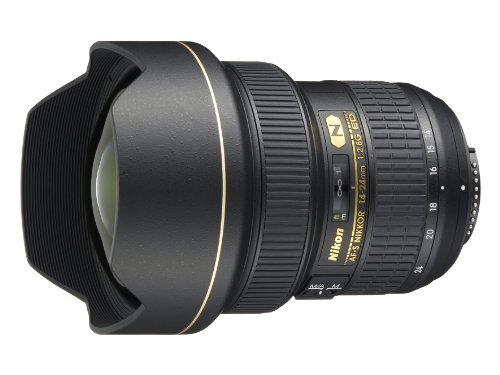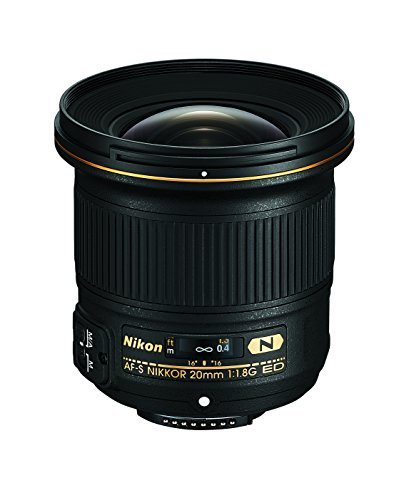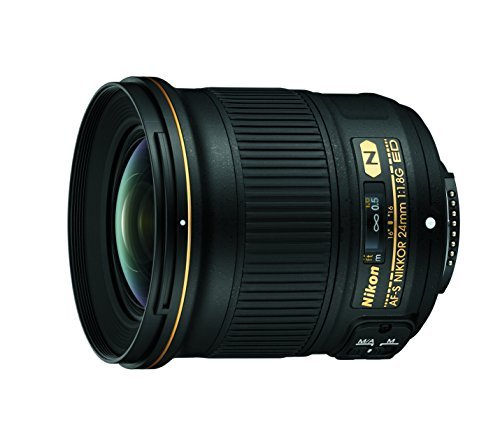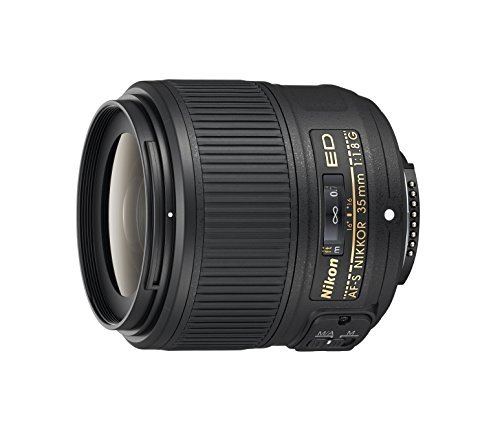If you are into astrophotography or night sky photography, you are indeed at the right place. If you are looking for wide-angle lenses to help you with your Milky Way photography or just wish to capture the breathtaking view of the start sky, you certainly need to check out the best Nikon Lens for Astrophotography, most of which are available for purchase online.
Nikon lens provide you with a better chance if you are planning to get some fantastic astrophotography shots. Beginners or experts can choose from wide angle lens to capture more sky or choose a lens that is fast (i.e. which has a low f/number).
Nikon has an amazing range of lenses that provide the perfect shot, and are within the budget as well. If you own a Nikon camera and wish to unleash its full potential, you certainly need a Nikon lens that is designed specially to meet its strict standards.
Let us now have a look at some of the best lens made available by Nikon for astrophotography.
Table of Contents
Toggle5 Best Nikon Lens For Astrophotography:
1.) Nikon 14-24mm f/2.8
This lens from Nikon is well known for its night performance. Astro photographers can easily shoot at f/2.8 and 14 mm and you will for sure gather some interesting and impressive shots.
As many experts say, no lens can be called as “perfect” when it comes to night sky performance. While f/2.8 might not be an ideal aperture when it comes to nighttime photography, you can use f/2.0 that allows more light and so you can use a low ISO. Priced at $1,696.95, the lens weighs about 2.20 pounds.
Nikon 14-24 mm f/2.8 is known for its high performance and has a wide angle zoom that is well optimized for FX as well as DX format sensors. The lens also features the exclusive ED glass of Nikon and comes with a Nano crystal coat. The AF-S zoom lens provides edge to edge sharpness on the FX and DX sensors.
Photographers can also control the chromatic aberrations, thanks to the extra low dispersion and PGM aspherical lenses provided. These enhance the sharpness along with the contrast.
Nikon lens also use the SWM or the Silent Wave Motor that provides high speed during auto focusing. Users will be surprised to see who powerful, accurate and super quiet operation this is. Also, users get to focus close to 10.8 inches when they use the 24 mm setting.
Nikon 14-24 mm f/2.8 includes the feature of M/A focus mode switch, which provides a quick toggle between auto and manual focus operations.
If you are looking for a balanced lens for night or Astrophotography, this is one of the best lenses you can buy without a second thought.
Pros
- The lens has enhanced formulas that provide good color, contrast and sharpness.
- Include the Nano Crystal coat to reduce flare or ghosting and to improve image quality
- Rugged construction
- Resistance to dust and moisture
- Nikon 14-24mm f/2.8 can also be used to photograph normal landscapes
Cons
- A few users felt that the lens is quite heavy and is not perfect
- The lens has deterred a number of potential buyers due to its price
2.) Nikon 24-70mm f/2.8E VR
If you are one of those who love night time photography, the Nikon 24-70 mm f/2.8E VR needs to your primary choice. The lens is about 2 stops darker than the lenses from other brands that are less in cost. Irrespective of that a number of people own this lens as it is a potential option.
Nikon 24-70 mm f/2.8E VR is popular as a workhorse lens and is used by professional photographers from across the world. The use of the lens is not limited to night photography and this is what makes it unique. Photographers can use it for portraits, candid shots and for picturing wide angle landscapes.
The lens has a constant aperture of f/2.8 and fast autofocus and uses state of the art optics. This makes the lens efficient and can be used effectively in low-light environments as well. The lens also provides excellent sharpness and microcontrast.
The optical design of this lens can be called complex as it includes about 20 elements in 16 groups. The lens is very balanced when it comes to sharpness and photographers now need not worry about the soft corners in their images.
The lens has 4 stops of “Vibration Reduction” and this is help for handheld as well as low light photography. The lens also has a nonstick glass and hence it is easy to wipe off any dirt or smudges.
Pros
- Delivers highest optical precision and performance
- Uses Aspherical ED a low dispersion lens
- The lens thread increased from 77mm to 82mm.
- Includes Nano coating and fluorine coating
Cons
- The lens is larger and much heavier when compared to other lens from Nikon
- The cost of the lens is $500 more than its predecessors.
3.) Nikon 20mm f/1.8
The Nikon 20mm f/1.8 is one of the best nighttime lenses that has the widest aperture. The weight of the lens is approximately 357 grams and it is available at a decent price of $800 online.
Photographers looking for ultra wide angle lens can choose the Nikon 20mm f/1.8 ED as they are flexible in situations where the photographer cannot move closer to the subject physically.
Many experts have suggested this to be a lot better than the 15-30mm f/2.8 and 14-24mm f/2.8 options even though it does not have similar depth. The Nikon 20mm f/1.8 lens is sharp and also has low flare levels, which allows the user to click very clean images even at night.
One of the most appealing factors of this lens is the low cost and the weight. Though $800 might not sound cheap, the price is much better when compared to other FX autofocus lens in the same segment. If you are looking for a lens for astrophotography at a medium budget, just go for it.
Pros
- Budget friendly and light weight
- Flexible and has a wider aperture
Cons
- The lens has a coma towards its corners which is quite noticeable.
4.) Nikon 24mm f/1.8 ED
The Nikon 24mm f/1.8 ED does not have an aperture like other lenses, but should not let you overlook this. If you are looking for all around lens, this is the one to choose.
The lens can be used for landscape photography too and it does work efficiently for nighttime photography as well. The lens is lightweight and is known as a great performer.
The lens is a little better than the 20mm f/1.8 but it does lack a little at times. One of the problems astrophotographers faced with the lens is that of the depth of field. The nearby objects in the picture’s foreground might appear a little blurry though.
If you into focal length of 24mm when compared to 14mm, this is the lens that is recommended, and it works well for beginners and experts alike. Though the lens does not let much light in, one can still use low ISOs during nighttime. The high optical quality of the lens is another factor that should never be overlooked.
Pros
- Excellent performance if you are using a DSLR camera
- Has a versatile wide angle lens that certainly widens your creativity
- 2 Aspherical Lens
- Has Nano crystal coat
- Built-in Silent Wave Motor
- Lightweight and less price
Cons
- Might not be suitable for experts who are into astrophotography
5.) Nikon 35mm f/1.8G ED
Nikon 35mm f/1.8 ED was launched after a number of Nikon users requested them to launch a lens similar to 35mm f/1.8G lens it launched for the DX cameras. Users who did not really wish to spend thousands of dollars on the professional lens were left with no options.
It was then that Nikon launched the 35mm f/1.8 ED with a price tag of $599 to fill the gap. The lens is not only cheaper but is compact and light weight.
The 35mm f/1.8 ED is neither too wide nor long and it works great for all kinds of photography. Be it the landscapes, the people or the night sky, the lens work just fine.
The lens has an aperture of f/1.8 and thus is great for low light photography. Users can also use this lens to isolate the subjects from their actual backgrounds. The lens work well on both FX and DX cameras and is a great buy for those who wish to use Nikon FX cameras in the future.
The Nikon 35mm f/1.8 ED lens has the Silent Wave Motor that provides a very quiet autofocus. It also includes an Extra-low Dispersion element that provides excellent sharpness and color correction.
The lens also has the Nikon Super Integrated Coating which provides color consistency and reduces the flare.
Pros
- The lens is known to be impressively fast
- Available at a good price
- Does not require much of a fine tuning
- Has a thick focus ring and is convenient to use
- Easy to clean and maintain
Cons
- Has a plastic filter thread
If you are looking forward to buy a new lens, it is always worth your time to check which lens is compatible with the camera you are using. Online shopping websites like Amazon have various search tools which you can use to find the right lens. Choosing the right lens for your camera can be a little tricky too.
So, we have some tips that will help you make the right choice.
Buyer’s guide on how to select the best Nikon Lens for Astrophotography
Would you love getting yourself with a brand new pair on Nikon DSLR? Else do you already own an SLR camera? Again, if you are a professional photographer, you definitely need to invest money on a high-quality lens.
You need to take photo shoots from a far-away location. Say a white tiger that is hitting on its prey. And the photo shoots must come out superbly.
Here is an exclusive buyer’s guide on how to select the best Nikon Lens for Astrophotography. Shall we go with the same?
The basic model
If you just love taking picture-perfect portraits, you can go for a general or an all-purpose Nikon lens. You get a fairly wide-angle view on the object you would love capturing in air.
Plus a general all-purpose focal lens also gives you the much needed length to cover full-on close ups or portrait pictures. The standard model is the Nikon 18-55 mm. The standard lens comes to you with the camera especially the moment you buy one.
Aperture
What do you understand by the term ‘aperture?’ It is the ability on how wide a lens can open up. This is measured in f stops. The lower is the f number, the better light you can capture.
You can look for a perfectly aligned pair of lens that provides you with a noticeably wider and a longer photoshoot. Taking pictures for a magazine or tabloid photo shoot requires an absolute degree of precision and clarity.
Apart from the coverage, the Nikon lens offers you with a wider aperture. You get the aperture wider at the long end of the zoom. This way, you get a better control over depth-of-field. The wider aperture also helps you get fantastic picture quality even when there is a dim lighting, at the vicinity.
Image Stability
You will have to consider buying a lens that can take quality pictures at every go. You can look for a pair of lens that are fitted with image stabilizers. This way, the photo shakes are reduced. The all-new Nikon AF-S DX- 18-140mm F3.5-5.6G ED VR reduces image shakes by almost four stops. Blurry or dull photos now become a thing of the past. Hence, selecting lens with lesser image-shakes is what makes your buy a superior one.
Focal Length
You need to consider the focal length, while trying to get yourself a brand new pair of lens. You may have a DSLR or a regular photo cam. A smaller focal length will capture more of the scene while a larger focal length brings the subject closer.
You therefore choose wide-angle lenses for capturing landscapes or natural surroundings. Telephoto lenses cover between 70-200 mm. These lenses cover wildlife, sports or even wedding ceremonies. Smart phones have wide angle lenses. That is why your nose looks bigger in most of the selfies you try taking via your phone.
You can also choose prime lenses that just focus on a single focal length. These lenses do not have the zoom aspect in them. This way, the lenses are smaller, brighter and sharper. Singular focal length lenses allow more light to penetrate through. This way, you take fantastic picture even in a dim-light setting.
Zoom-In Capacity
You can choose a digital camera that comes with a fantastic zooming capacity. If you want to capture the perfectly lovable moments of your tiny tot while on vacation, you can start shooting.
This way, those adorable moments come to life when you watch the images on your desktop or laptop. The Nikon P1000 comes to you with a 125X zoom-in capacity. The camera is slightly a higher priced one, owing to its quality.
You can check for models online if you want lens with the perfectly aligned zoom-in capacity. A basic model comes to you with a lens with just a 3X zoom power. It is surely good enough but not the best.
Stylish Models
Definitely, you want your brand new pair of lens to look super-stylish while you try fitting it into your DSLR. You can look for a 50mm f/1.8 model on lens that is great for low-light photos. You can snap pictures of your pets in a captivating manner. You get fabulous portraits as well. This is a stylish one that makes your heart skip a beat.
Other factors
These are general factors that should help you with the right purchasing decision. The points have been collated in the form of bullets.
- Shop across multiple sites. To bag a great buy without compromising on the quality, you need to shop across multiple sites online. Take a free online chat and discuss important considerations you look at, before you go in with the buy.
- Look for manufacturer’s warranty. You can ask for a live demo of the product. This is especially useful for buyers who prefer buying their stand-alone lens or a camera. From a retail store or brick and mortar establishments. Look for the spare parts the warranty covers from the time you buy your DSLR or lens. After all, you invest so much on the equipment. Hence, you should get the best value for your money.
- Look for online customer testimonials to see what they have to say about the product you plan buying.
FAQs related to best Nikon lens for astrophotography
Capturing the Milky Way can be the most exciting one for a professional photographer. Tabloid photo shoots on galaxy or outer space can be a rewarding one as well.
Presenting you with 5 FAQs related to best Nikon Lens for Astrophotography:
What is the best Nikon astrophotography lens I can buy on a budget?
Well, let me explain, the features you get, from the lens dedicated to, leaning towards the sky. Photography is really not cheap, especially when you have a fascination towards capturing the stars.
As you are a beginner and an astrophotography lens can cost you thousands of dollars, this would be the one. You can go in for a standard lens kit as you get sharp images. It is affordable enough for beginners without compromising on the quality. And lastly, you get a super fantastic finish on a solid build.
Can I get wonderful options on a wider aperture?
If wide-angle lens or wider aperture is what you are looking at, then this would be the obvious choice. The quick and accurate focus is made possible with certain innate features added to the DSLR. These include floating inner focusing system and Hyper sonic motor as well. The lens captures a shallow depth of field. This way, you get beautiful pictures across a soft back ground. The pick is a great one for Milky Way lovers.
What lens suit portraits, street photography and astrophotography to suit my varied interests on taking pictures?
You eventually discover that 50 mm lenses are a photographer’s favorite. These are range of lenses that help you indulge into portraits, street photography and even astrophotography.
As I love taking photos targeting the night sky, which focal lens is the preferred variant for me?
You can opt for ultra-wide angle with a fixed f/2.8 aperture to take those breath taking pictures during the night. You get sharp images even in a dim light. This is a fantastic pair of lens if you are fascinated towards astrophotography. Mind-boggling optics, low chromatic aberration and fantastic image stabilization are other attractive features you can look at.
Is buying a standard version on prime lens a great choice?
You can always rely on prime lenses for photography. The main reason behind this is simple. These are a range of lenses that are highly versatile in nature.
Well, these are some of the FAQs related to the best Nikon lens for astrophotography.
So, now that you are aware of the best Nikon lens for astrophotography, zoom right ahead and explore the night world without further ado.
People Also Like:
Best Canon Lens for Astrophotography
Best Lens for Night Photography








